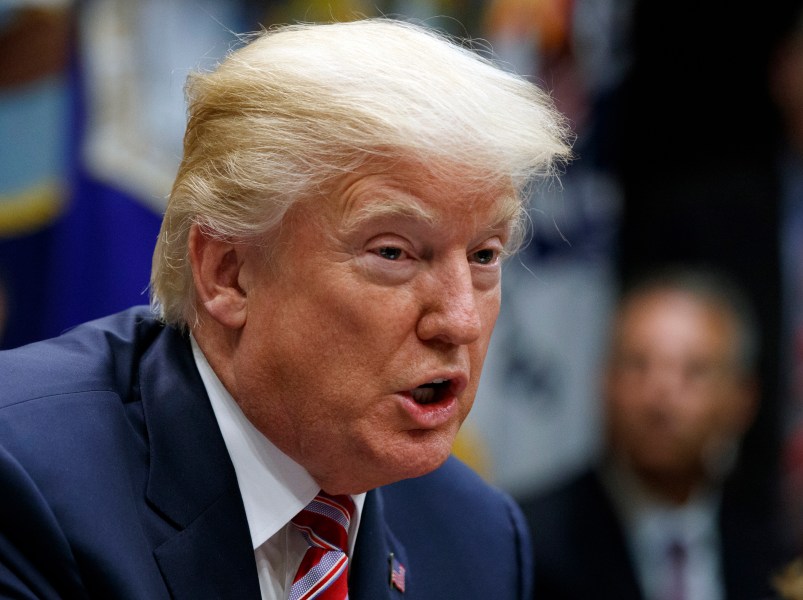Over the last four days President Trump has made a series of statements demanding his Justice Department ‘investigate’ Hillary Clinton and other Democratic enemies. These demands aren’t entirely new. But by their specificity, repetition and speed they represent a new departure in demands for extra-legal action and rule. We should note that Trump is increasingly acting like a dictator or would be strong man. The only difference is that the machinery of government, seemingly up to at least some of his high level appointees, seems to be largely ignoring him. This is much better than the alternative. But it is still a bad, dangerous development.
My own best guess – supported by a good deal of public reporting – is that what we see on the President’s twitter feed is what Freudians might call his id, his most unvarnished and unrestrained desires and demands. In some sense twitter must be acting as a release valve. These sound like demands he’s making of advisors in private settings, only to see a significant number of them refused, argued against or in many cases ignored. This came through explicitly in that Thursday afternoon talk radio interview where the President said he was “frustrated” that he’s not allowed to command the FBI and DOJ to attack his political enemies.
Trump says he “instructed” Congress it “must end” green card lottery program. pic.twitter.com/VsHKniWIj1
— Josh Marshall (@joshtpm) November 3, 2017
A related moment came when the President reacted to the Manhattan truck attack by telling Laura Ingraham he had “instructed” the Congress that it “must” end the green card lottery program. The day before he said he was “today starting the process Of terminating the diversity lottery program.” Today he said flatly that “the reason our stock market is so successful is because of me.”
One might be tempted to see this merely as Trump-speak, the kind of nonsensical braggadocio his advisors routinely tell reporters is to be interpreted loosely or disregarded altogether. There’s also a clear dissonance in seeing a President who can’t seem to pass any legislation acting as though his word acts as legislative fiat. Not only can he not command Congress his very presence seems to paralyze it.
But this isn’t as contradictory as it may seem. As I wrote in the Spring, incompetence and authoritarian aren’t in tension. They tend to operate together, each catalyzing each other as both cause and effect.
Incompetence and authoritarianism aren’t incompatible or even in tension. Historically they tend to go together. Incompetence and failure borne of ineptitude tend to show up both as a cause and outcome of democratic breakdown and collapse. Small-d democratic government is hard, by design. It’s meant to be. It should be. But it’s not just hard. It relies on a particular package of skills: persuasion, inspiration, patience, canny use of patronage, threats, carrots and sticks, both consensus building and fight. Look at a Lincoln, an FDR, a Reagan – whatever you think of the different men’s politics, successful presidents are almost quite good at using this toolkit.
Just running down the list, virtually none of these are Trumpian traits. So in addition to the other obstacles he faces, it’s hardly surprising that he’s been such a flop as a chief executive. As any political scientist will tell you, the formal powers of the Presidency, outside of war-fighting, are quite limited. The lack of patience, focus and skills appeared immediately with Trump as he gravitated toward the easy and mostly meaningless sugar high of executive orders over the hard work of legislating. It’s no mystery why he’s failed so miserably. It’s no mystery why he’s now so focused on how … basically democracy, the machinery of democratic government is the problem, how it’s not “fair”.
Not fair to who exactly? Trump, of course.
The ratchet like pattern is clear. The more Trump fails as President, the more he is convinced he requires extra-constitutional powers. More directly, the more he fails he seems to be convinced that his advisors are mistaken when they tell him the ad hoc command regime he used to run his private business won’t work in government. He’s tried their way he says and look what it’s gotten him.
Only days before he went on a tear attacking the whole US legal system as a “laughingstock” and a “joke”.
Trump lashes out at US federal justice system as "joke" and "laughing stock." pic.twitter.com/Aa5vJumWvd
— Josh Marshall (@joshtpm) November 1, 2017
I had written most of this post on Saturday. This morning I noticed this new story about President Trump telling some Native American tribal chiefs he was meeting with to simply break federal law since energy regulations were holding them back. His aides are always quick to say that these broadsides are just Trumpisms, rhetorical flourishes. He doesn’t actually mean break federal law. There’s only so far it makes sense to go in divining what Trump really ‘means’. That’s the classic over-determined quesiton. There’s not really any there there. It’s all impulse and frustration and assertion. It doesn’t ‘mean’ anything. It’s sort of beside the point. In his plain words he is telling people to break the law. Someone will hear him say those things and – not surprisingly – assume he means it and break the law at the President’s bidding. There’s little doubt this has already happened.
My point in pulling together this flurry of statements is that these demands are accelerating. The wild demands for power are increasing with his frustration in his inability to exercise power as a democratic head of state. They are also, clearly, accelerating as he feels Robert Mueller’s investigation get closer to his family, his inner circle and himself.
This will keep accelerating and may reach a breaking point soon. His legal position and his humiliations in the job are not getting any better.






